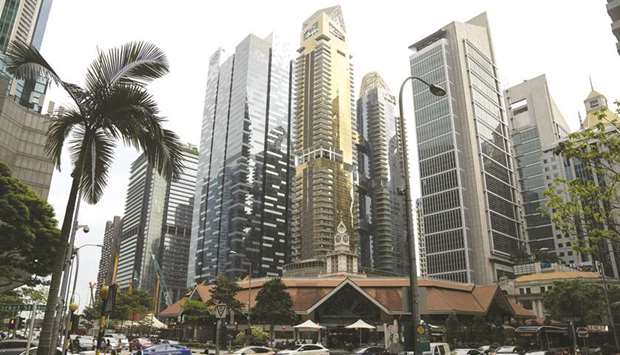Singapore banks will extend debt relief for individuals and small-to-midsized businesses beyond the end of the year to support borrowers hardest hit by the coronavirus pandemic.
The measures, set to expire on December 31, will now progressively end over 2021, the Monetary Authority of Singapore said in a statement. The extended programme will be tiered so those businesses needing the most help – such as aviation and tourism – can defer 80% of their principal repayments for as long as June 30, the regulator said.
Individuals with property loans who are unable to resume making full repayments due to a loss of income can apply for reduced payments pegged at 60% of their monthly instalments for as long as nine months.
Borrowers struggling to pay unsecured revolving credit facilities can apply to have repayments at a lower rate, the MAS said.
The Singapore government, like many around the world, is trying to navigate what’s expected to be a record recession brought on by the pandemic. Authorities are taking steps to mitigate the so-called “cliff effect” on consumers and businesses once relief measures end. The city state has pledged virus aid of around S$100bn ($73bn).
“We want to continue providing relief to borrowers facing cash flow challenges while encouraging them to resume loan repayments to the extent they are able to, so that they do not accumulate too much debt,” MAS Managing Director Ravi Menon said in the statement.
Bloomberg reported last week that the regulator and banks had been in talks for the possible extension.
As of August, more than S$11.5bn of SME loans and about S$29bn of property loans had been deferred, the MAS said. That’s about 6% of Singapore banks’ S$677.9bn in outstanding loans.
The number of mortgage deferments has tapered off since the peak in the second quarter, when more individuals were affected by so-called circuit-breaker measures put in place to stem the spread of the coronavirus, according to the MAS.
Like their global peers, local lenders DBS Group Holdings Ltd, Oversea-Chinese Banking Corp and United Overseas Bank Ltd are bracing for a wave of soured loans. Collectively, they allocated S$4bn in provisions during the first half.
The extension of the debt relief measures could delay banks’ stress recognition to 2021 and 2022, clouding their ability to assess the impact of the virus on asset quality, according to Bloomberg Intelligence analyst Diksha Gera.
“Banks could raise prudential provisions this year to cushion the impact from bad loans once support fades,” Gera said in a September 30 report. The government’s fiscal boost of around S$100bn should ease the default burden on banks, she added.
Separately, the Ministry of Law will introduce a bill this month to make it simpler and cheaper for very small companies to file for insolvency, restructuring or dissolution.

Buildings stand in the central business district in Singapore. Banks will extend debt relief for individuals and small-to-midsized businesses beyond the end of the year to support borrowers hardest hit by the coronavirus pandemic.
